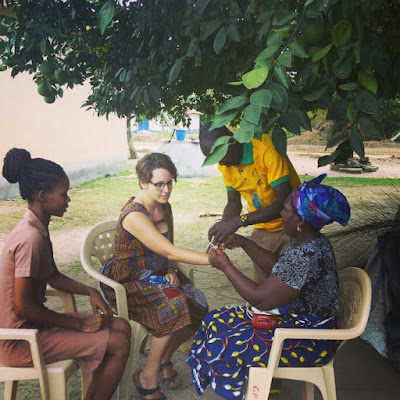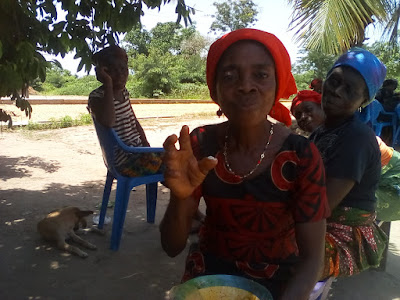Hail to the Chief!
Before I got to Ghana, I was under the impression that chiefs were a bit of the thing of the past. I knew that Ghana was a democracy--one of the most stable democracies in Africa, with free and fair elections. Just like the United States, it has a President who is elected every four years. Under this system, where is there room for a chief?
That's what I thought. But oh, how wrong I was.
Every community has a hereditary Chief and Queen Mother. They are not related to each other, and they aren't married; rather, there is generally one family in town that produces Chiefs, and another which produces Queen Mothers.
The Chief generally controls just about everything in town. When I wanted to start teaching English lessons, I asked the Chief. When I wanted to form a committee to discuss sanitation projects in the community, I asked the Chief. When the nurses wanted to build a garden, they asked the Chief. In fact, although the President may be head of the nation, the Ghanaian national government gives a great deal of autonomy to local chiefs. They don't tend to interfere in chieftancy disputes, even if they become violent.
Just being the son of a chief is not enough to guarantee that you'll be the chief when your father dies. If a new chief has to be chosen, the elders in the community will generally get together to select the candidate that they feel is most suitable. That person doesn't necessarily have to be in the community on a day-to-day basis; some communities have chiefs who live in the national capital, or even abroad. In those cases, someone generally stands in to make choices about local governance in the chief's stead.
Our chief is a pretty cool guy, and he had absolutely no problem with any of the requests I've made of him. Still, the set-up is pretty formal. When I was first introduced to my chief, I had to bow to him. He is always called by his title, "Togbui," instead of his name. I don't know his name, so there's no chance I'll accidentally use it, but I did call the Queen Mother "Janet" once, by accident, to general horror. Don't worry. I learned my lesson. I don't have too much personal interaction with the chief. Occasionally, he asks me to marry him. I'm pretty sure he's joking, but in any case, he's got his hands full with two wives already.
In my community, the chief doesn't live a life that's much different from anyone else. He goes to his farm and works, and his house is modest, though we still call it a palace. In other communities that I've visited in Ghana, chiefs have been much more formal. As a Peace Corps Trainee, I visited communities where we had to remove our shoes before greeting the chief and weren't able to speak directly to him; rather, we spoke to someone who held the position of "linguist," who spoke to the chief on our behalf.
The Queen Mother, on the other hand, I see quite a bit. She's the leader of the women in the community, and is hugely approachable. When I first moved in, she gave me a "two-yard," which is a bolt of cloth that Ghanaians use as clothing, to carry babies, as a towel, as a blanket...the list goes on. I really enjoy spending time with her, even though I spend the first couple of months of our acquaintance-ship unsure if I was allowed to make eye-contact. About half of the community used to urge me to go and visit her, telling me that she would be insulted if I by-passed her house while making community rounds. The other half told me that it would be a massive imposition to approach the Queen unannounced. It was confusing.
Overall, though, I think that the culture surrounding chieftaincy is a really interesting and unique part of Ghanaian culture, and probably not one that a lot of Americans are familiar with. Learning about it (and I am by no means an expert) has taught me a lot about how big the world is, and how interesting and unique it can be. I feel grateful to have the chance to learn about a new culture, and I'm glad I have so much time left here to continue learning even more.
That's what I thought. But oh, how wrong I was.
Every community has a hereditary Chief and Queen Mother. They are not related to each other, and they aren't married; rather, there is generally one family in town that produces Chiefs, and another which produces Queen Mothers.
Here is me with the Queen Mother and Chief tying a bracelet to my wrist to welcome me to the community. Next to me is our community nurse, Emelia.
The Chief generally controls just about everything in town. When I wanted to start teaching English lessons, I asked the Chief. When I wanted to form a committee to discuss sanitation projects in the community, I asked the Chief. When the nurses wanted to build a garden, they asked the Chief. In fact, although the President may be head of the nation, the Ghanaian national government gives a great deal of autonomy to local chiefs. They don't tend to interfere in chieftancy disputes, even if they become violent.
Just being the son of a chief is not enough to guarantee that you'll be the chief when your father dies. If a new chief has to be chosen, the elders in the community will generally get together to select the candidate that they feel is most suitable. That person doesn't necessarily have to be in the community on a day-to-day basis; some communities have chiefs who live in the national capital, or even abroad. In those cases, someone generally stands in to make choices about local governance in the chief's stead.
Our chief is a pretty cool guy, and he had absolutely no problem with any of the requests I've made of him. Still, the set-up is pretty formal. When I was first introduced to my chief, I had to bow to him. He is always called by his title, "Togbui," instead of his name. I don't know his name, so there's no chance I'll accidentally use it, but I did call the Queen Mother "Janet" once, by accident, to general horror. Don't worry. I learned my lesson. I don't have too much personal interaction with the chief. Occasionally, he asks me to marry him. I'm pretty sure he's joking, but in any case, he's got his hands full with two wives already.
In my community, the chief doesn't live a life that's much different from anyone else. He goes to his farm and works, and his house is modest, though we still call it a palace. In other communities that I've visited in Ghana, chiefs have been much more formal. As a Peace Corps Trainee, I visited communities where we had to remove our shoes before greeting the chief and weren't able to speak directly to him; rather, we spoke to someone who held the position of "linguist," who spoke to the chief on our behalf.
The Queen Mother, on the other hand, I see quite a bit. She's the leader of the women in the community, and is hugely approachable. When I first moved in, she gave me a "two-yard," which is a bolt of cloth that Ghanaians use as clothing, to carry babies, as a towel, as a blanket...the list goes on. I really enjoy spending time with her, even though I spend the first couple of months of our acquaintance-ship unsure if I was allowed to make eye-contact. About half of the community used to urge me to go and visit her, telling me that she would be insulted if I by-passed her house while making community rounds. The other half told me that it would be a massive imposition to approach the Queen unannounced. It was confusing.
Overall, though, I think that the culture surrounding chieftaincy is a really interesting and unique part of Ghanaian culture, and probably not one that a lot of Americans are familiar with. Learning about it (and I am by no means an expert) has taught me a lot about how big the world is, and how interesting and unique it can be. I feel grateful to have the chance to learn about a new culture, and I'm glad I have so much time left here to continue learning even more.




Comments
Post a Comment